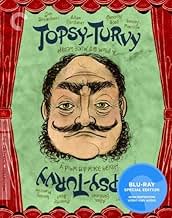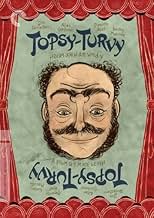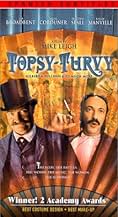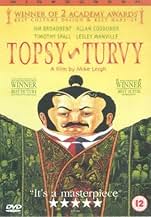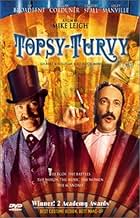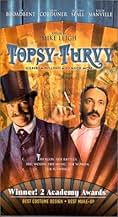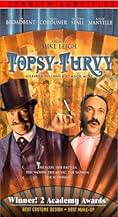PUNTUACIÓN EN IMDb
7,3/10
14 mil
TU PUNTUACIÓN
Añade un argumento en tu idiomaSet in the 1880s, chronicles how during a creative dry spell, the partnership of the legendary musical/theatrical writers Gilbert and Sullivan almost dissolves, before they turn it all aroun... Leer todoSet in the 1880s, chronicles how during a creative dry spell, the partnership of the legendary musical/theatrical writers Gilbert and Sullivan almost dissolves, before they turn it all around and write the Mikado.Set in the 1880s, chronicles how during a creative dry spell, the partnership of the legendary musical/theatrical writers Gilbert and Sullivan almost dissolves, before they turn it all around and write the Mikado.
- Ganó 2 premios Óscar
- 13 premios y 28 nominaciones en total
Bill Neenan
- Cook
- (as William Neenan)
Reseñas destacadas
George Martin once talked about he and John Lennon once having a drink in a British pub. One of the regulars went over to the jukebox and selected "Yesterday." Lennon sighed, turned to Martin and said, "Don't suppose anyone's going to put in 'I am the Walrus?'" Martin went on to suggest that as frustrated as Lennon was of Paul McCartney's "Granny Music," he also couldn't deny McCartney's talent and the ease with which he came up with unforgettable melodies.
One senses the same kind of rivalry between Arthur Sullivan and William Gilbert in Mike Leigh's "Topsy-Turvy." Gilbert and Sullivan were both famous for their hilarious musical comedies in the mid to late 1880s, especially their early hits "H.M.S. Pinafore" and "The Pirates of Penzance." But the film takes place later in their career and things are not boding well for the duo. Sullivan (Alan Corduner) is growing increasingly frustrated with his collaborations with Gilbert, because he feels he is not growing as a composer. "I'm growing tired of these soufflés with Gilbert and his topsy-turvvydom."
Gilbert (Jim Broadbent) is feeling the crunch himself. His latest production with Sullivan has resulted in questions concerning Gilbert's creative spark, as in whether he has one. If that isn't enough, the Savoy Theatre tells the frustrated Sullivan that he and Gilbert are contractually obligated to one more show. Gilbert presents Sullivan with an idea. Sullivan responds that the idea sounds like a remake of an earlier play.
Then inspiration comes from the most unlikely of places. A Japanese Exhibit is being held in London and Gilbert's wife, Kitty (Lesley Manville) forces him to accompany her. Reluctantly Gilbert goes and, reenergized, he picks up a souvenir Samurai sword. He meets with Sullivan again and tells him his idea: "The Mikado." Thus is born Gilbert and Sullivan's last hit play.
The next half of the film deals with the backstage politics and adventures that go with putting on a production. It is here where "Topsy-Turvy" goes into full gear and really begins to shine. Broadbent and Corduner also shine in their respective roles, as well. And it is here where I really paid attention to Leigh's characterizations. The two never had a very friendly relationship and Sullivan was openly bored with Gilbert's silly plays. I always took it for Gilbert being a really witty and good-humored man, and Sullivan being a snob. But Leigh has Sullivan as a fun-loving hedonist and Gilbert being unpersonable and sarcastic. He uses humor as a weapon. The film forced me to look at the two of them in a new light, and more importantly, I bought it.
But Leigh's real achievement is in presenting his supporting cast as three-dimensional characters. There's Richard Temple (Timothy Spall) who plays the Mikado and suffers near-betrayal at the hands of his mentor, Gilbert. Actresses Jessie Bond (Dorothy Atkinson) and Lenora Braham (Shirley Henderson) personify the reluctant acceptance of wearing a kimono with no corset. Leigh brings the same care to this period drama as he has done for his smaller ensemble pieces.
And care is what "Topsy-Turvy" is all about. As much as Sullivan may frown at Gilbert's wit, he still wants to create the best possible product he can. There's a great scene where Gilbert is explaining "The Mikado" to Sullivan and Sullivan is truly enjoying the story. He's got such a look of glee on his face throughout the scene. Corduner does a great job of contrasting his Sullivan with Broadbent's Gilbert, especially in his scenes with the orchestra as he patiently explains the score with his players.
Broadbent, on the other hand, is an absolute joy as Gilbert. Gilbert may not be a likable character, but he knows what he wants and he is good at what he does. He may be short with everyone and unbending, but he gets results.
Leigh shows a clear love for the theatre here, and the details are amazing all the way from the theatre set to the costumes, nothing is out of place. He also keeps the action moving in the film which totals almost three hours but never feels like it. That's very hard to do.
To be honest, I thought Leigh was jumping on the "Shakespeare in Love" bandwagon, but the films couldn't be more different. "Shakespeare in Love" celebrates love burgeoning creativity. "Topsy-Turvy" deals with the love of creativity itself and shows how people of different temperaments and tastes can still get together and produce greatness.
Topsy-Turvy ****
One senses the same kind of rivalry between Arthur Sullivan and William Gilbert in Mike Leigh's "Topsy-Turvy." Gilbert and Sullivan were both famous for their hilarious musical comedies in the mid to late 1880s, especially their early hits "H.M.S. Pinafore" and "The Pirates of Penzance." But the film takes place later in their career and things are not boding well for the duo. Sullivan (Alan Corduner) is growing increasingly frustrated with his collaborations with Gilbert, because he feels he is not growing as a composer. "I'm growing tired of these soufflés with Gilbert and his topsy-turvvydom."
Gilbert (Jim Broadbent) is feeling the crunch himself. His latest production with Sullivan has resulted in questions concerning Gilbert's creative spark, as in whether he has one. If that isn't enough, the Savoy Theatre tells the frustrated Sullivan that he and Gilbert are contractually obligated to one more show. Gilbert presents Sullivan with an idea. Sullivan responds that the idea sounds like a remake of an earlier play.
Then inspiration comes from the most unlikely of places. A Japanese Exhibit is being held in London and Gilbert's wife, Kitty (Lesley Manville) forces him to accompany her. Reluctantly Gilbert goes and, reenergized, he picks up a souvenir Samurai sword. He meets with Sullivan again and tells him his idea: "The Mikado." Thus is born Gilbert and Sullivan's last hit play.
The next half of the film deals with the backstage politics and adventures that go with putting on a production. It is here where "Topsy-Turvy" goes into full gear and really begins to shine. Broadbent and Corduner also shine in their respective roles, as well. And it is here where I really paid attention to Leigh's characterizations. The two never had a very friendly relationship and Sullivan was openly bored with Gilbert's silly plays. I always took it for Gilbert being a really witty and good-humored man, and Sullivan being a snob. But Leigh has Sullivan as a fun-loving hedonist and Gilbert being unpersonable and sarcastic. He uses humor as a weapon. The film forced me to look at the two of them in a new light, and more importantly, I bought it.
But Leigh's real achievement is in presenting his supporting cast as three-dimensional characters. There's Richard Temple (Timothy Spall) who plays the Mikado and suffers near-betrayal at the hands of his mentor, Gilbert. Actresses Jessie Bond (Dorothy Atkinson) and Lenora Braham (Shirley Henderson) personify the reluctant acceptance of wearing a kimono with no corset. Leigh brings the same care to this period drama as he has done for his smaller ensemble pieces.
And care is what "Topsy-Turvy" is all about. As much as Sullivan may frown at Gilbert's wit, he still wants to create the best possible product he can. There's a great scene where Gilbert is explaining "The Mikado" to Sullivan and Sullivan is truly enjoying the story. He's got such a look of glee on his face throughout the scene. Corduner does a great job of contrasting his Sullivan with Broadbent's Gilbert, especially in his scenes with the orchestra as he patiently explains the score with his players.
Broadbent, on the other hand, is an absolute joy as Gilbert. Gilbert may not be a likable character, but he knows what he wants and he is good at what he does. He may be short with everyone and unbending, but he gets results.
Leigh shows a clear love for the theatre here, and the details are amazing all the way from the theatre set to the costumes, nothing is out of place. He also keeps the action moving in the film which totals almost three hours but never feels like it. That's very hard to do.
To be honest, I thought Leigh was jumping on the "Shakespeare in Love" bandwagon, but the films couldn't be more different. "Shakespeare in Love" celebrates love burgeoning creativity. "Topsy-Turvy" deals with the love of creativity itself and shows how people of different temperaments and tastes can still get together and produce greatness.
Topsy-Turvy ****
Gilbert and Sullivan are a successful musical team writing their shows for the Savoy Hotel in London. However Sullivan is tired and is suffering from ill-health. During a bad bout he resolves to no longer write for the Savoy with Gilbert but instead to recover in France and then to strike out alone and write a grand opera. Gilbert meanwhile, is showing signs of fatigue coming up with plots that use the same devices to the same ends. However the two are contractually obliged to continue their relationship, a prospect both seem ill at ease with until Gilbert takes an afternoon off at an exhibition of Japanese culture, sowing the seeds of inspiration for The Mikado.
I honestly had never even heard of this film until the television premier in 2002, if you had told me Mike Leigh had made a film on such subject matter I would likely have laughed down my sleeve at such a suggestion. However I gave this a watch despite the fact I know little (or care little) for the works of Gilbert and Sullivan and worries bout the fact it was 160 odd minutes long! However the plot is sufficiently well delivered to take those who only know a little about the pair to keep up. By taking the snapshot of the Mikado to show their relationship the film takes away what could have been a rough, sprawling epic the snapshot works much better. The weaving of the production into the narrative, rather than all at the end, means that both sets of fans will be happy there is enough music to please those who came for that, but also enough plot within to drive the film.
Leigh does very well, mixing humour and telling drama with the music of the show. The production of the film (and the production!) are both very good and the detail is fine. The cast are all excellent. Broadbent is good as the straight-laced Gilbert and his chemistry with the enjoyable Corduner works throughout. The support cast are all good in singing and non-singing scenes I was surprised to see Spall carrying the tunes so well!
Overall this is a good film but I doubt that Gilbert & Sullivan will be much of a draw even now that it is on TV. However if you have the chance to watch it then you should push through your reservations and give it a try it is engaging and humourous enough to overcome a lack of knowledge (or interest) in the pair's work.
I honestly had never even heard of this film until the television premier in 2002, if you had told me Mike Leigh had made a film on such subject matter I would likely have laughed down my sleeve at such a suggestion. However I gave this a watch despite the fact I know little (or care little) for the works of Gilbert and Sullivan and worries bout the fact it was 160 odd minutes long! However the plot is sufficiently well delivered to take those who only know a little about the pair to keep up. By taking the snapshot of the Mikado to show their relationship the film takes away what could have been a rough, sprawling epic the snapshot works much better. The weaving of the production into the narrative, rather than all at the end, means that both sets of fans will be happy there is enough music to please those who came for that, but also enough plot within to drive the film.
Leigh does very well, mixing humour and telling drama with the music of the show. The production of the film (and the production!) are both very good and the detail is fine. The cast are all excellent. Broadbent is good as the straight-laced Gilbert and his chemistry with the enjoyable Corduner works throughout. The support cast are all good in singing and non-singing scenes I was surprised to see Spall carrying the tunes so well!
Overall this is a good film but I doubt that Gilbert & Sullivan will be much of a draw even now that it is on TV. However if you have the chance to watch it then you should push through your reservations and give it a try it is engaging and humourous enough to overcome a lack of knowledge (or interest) in the pair's work.
Not being a big fan of opera (of the comedic variety or otherwise), I chose to watch this movie as a period piece, hoping to see a lot of eccentric characters putting on even more eccentric theatre. That was easy, since the trailer for the film points in that direction entirely.
What I didn't expect was a thoroughly entrancing inside view of the Victorian theatre. Not to mention comprehensive. Everyone is covered in this - from the stage boy through the chorus through the leads and producers and assistant directors. The telling of the complex relationships between the directors (Gilbert and Sullivan) and the leads is particularly poignant - whether dealing with the actors' considerable egos or their individual popularity among the chorus, nothing presented doesn't ring true.
I loved everything about this movie. It's a great story, told wonderfully by all involved. It is truly a film of much love and craft.
And I expect I'll be attending the next run of the Mikado next time it comes to town.
What I didn't expect was a thoroughly entrancing inside view of the Victorian theatre. Not to mention comprehensive. Everyone is covered in this - from the stage boy through the chorus through the leads and producers and assistant directors. The telling of the complex relationships between the directors (Gilbert and Sullivan) and the leads is particularly poignant - whether dealing with the actors' considerable egos or their individual popularity among the chorus, nothing presented doesn't ring true.
I loved everything about this movie. It's a great story, told wonderfully by all involved. It is truly a film of much love and craft.
And I expect I'll be attending the next run of the Mikado next time it comes to town.
10ahab1013
Simply put, a brilliant film.
Topsy Turvy captures Gilbert and Sullivan in the midst of a turbulent period in their partnership. Desperate to be taken more seriously as a composer, Arthur Sullivan attempts to renege on the Gilbert and Sullivan contract with the Savoy Theatre. While his partner William S Gilbert struggles to come up with something new to write about. Each man, in a sense, is longing for individual acclaim but they are trapped in an entity neither one can shake. The fame of their collective energies has taken on a life of its own and the theater crowds want more.
The film is mostly the story of a theater production of the Mikado, one of Gilbert and Sullivan's most famous operas. Director Mike Leigh, notorious for writing on the go, has structured a play within a play to a great delight. Jim Broadbent and Allan Corduner are brilliant as Gilbert and Sullivan, and Tim Spall has a wonderful turn as one of the actors, Mr. Temple.
Their is more here than just two playwrights. The entire cast is seen as more than just pieces of a production. From choristers to administrative personnel, Topsy Turvy is alive with characters. One of the best is Gilbert's long-suffering wife Kitty. Bereft of children and saddled with a husband who doesn't show outward affection, Kitty (Lucy) could be a two dimensional afterthought. However, her pain at being childless is wonderfully played by Lesley Manville. It is clear they love each other but neither is capable of articulating that love, very odd for a man who writes for a living.
Filled with humor and grace, Topsy Turvy is one of the best films about acting and a beautiful embrace of all things theatrical.
Topsy Turvy captures Gilbert and Sullivan in the midst of a turbulent period in their partnership. Desperate to be taken more seriously as a composer, Arthur Sullivan attempts to renege on the Gilbert and Sullivan contract with the Savoy Theatre. While his partner William S Gilbert struggles to come up with something new to write about. Each man, in a sense, is longing for individual acclaim but they are trapped in an entity neither one can shake. The fame of their collective energies has taken on a life of its own and the theater crowds want more.
The film is mostly the story of a theater production of the Mikado, one of Gilbert and Sullivan's most famous operas. Director Mike Leigh, notorious for writing on the go, has structured a play within a play to a great delight. Jim Broadbent and Allan Corduner are brilliant as Gilbert and Sullivan, and Tim Spall has a wonderful turn as one of the actors, Mr. Temple.
Their is more here than just two playwrights. The entire cast is seen as more than just pieces of a production. From choristers to administrative personnel, Topsy Turvy is alive with characters. One of the best is Gilbert's long-suffering wife Kitty. Bereft of children and saddled with a husband who doesn't show outward affection, Kitty (Lucy) could be a two dimensional afterthought. However, her pain at being childless is wonderfully played by Lesley Manville. It is clear they love each other but neither is capable of articulating that love, very odd for a man who writes for a living.
Filled with humor and grace, Topsy Turvy is one of the best films about acting and a beautiful embrace of all things theatrical.
10Tom-207
I was introduced to Gilbert & Sullivan in my very early teens under the auspices of the parents of one of my friends. They took us to Falmouth on Cape Cod to a place called Highfield, the summer home of the Oberlin College Players. They specialized in G&S and other light operettas.
I learned to appreciate G&S, but I never became a fanatical devotee, even with the historical context patiently explained to me by my friend's mom. (It was similar with Shakespeare. The language could be a barrier rather than a gateway.)
The audience in the theater where I saw Topsy-Turvy was filled with devotees. You could hear their delight as they viewed the actual performances of Gilbert & Sullivan's work in the film. The director, Mike Leigh, through skillful editing and camera work, does an excellent job of photographing a stage presentation, certainly one of the best I've ever seen on film. He uses closeups, and though the actors are using an exaggerated, theatrical style, somehow the G&S material has never been clearer to me; and I've seen at least a dozen G&S performances, including two D'Oyle Carte productions (Pirates and The Mikado), the present-day descendant company of the Savoy Theater depicted in the film. People who have never seen G&S before will appreciate their work here.
Most of all, the film is very much about the highly contrasting personalities of William S. Gilbert and Sir Arthur Sullivan, the former emotionally restrained, the latter a hedonist. Leigh allows us to get to know them quite well and a host of other characters too, though G&S are first among equals in this excellent, ensemble cast. Among the supporting players, I found Shirley Henderson to be increasingly interesting as the film progressed, and I felt rewarded when she was the central character in the last two scenes of the film.
The period settings, manners, and speech are very accurate and detailed. As presented here, the Victorian era seems physically stifling, with people leading their lives in the close quarters of dressing rooms, offices, restaurants, living rooms, and bedrooms. Even more stifling is the emotional inhibition masked by correctly blustery forthrightness. Toward the end of the film, there's a revealing and poignant scene between Gilbert and his wife which makes this all very clear, and what also becomes clear is how important theatrical presentations were to people then as a means of expressing themselves in a culture which sanctioned few quarters to do so. It's one of the best examples of Mike Leigh's direction.
The G&S operettas were, of course, a commentary on Victorian times. In the film, you can see why they were so wildly popular. In that period, I think so many people were so restrained and distant from their own feelings that even the, to us, mannered and wordy G&S operettas were a breath of fresh air in Victorian England. The few occasions when Leigh breaks out of consistently claustrophobic medium shots and closeups are when he gives us a wide view of the full, theatrical stage.
Topsy-Turvy is about how Gilbert and Sullivan refracted Victorian England through a proscenium arch. Mike Leigh refracts it again through the camera lens in a way that allows us to see ourselves in our times by looking at G&S and their operettas in theirs. This is a long film (over two and one half hours), and given the subject matter, not to everyone's interest, though it's far more than the specifics of the period and the material. I found it to be my favorite film of the year thus far, and I highly recommend it.
I learned to appreciate G&S, but I never became a fanatical devotee, even with the historical context patiently explained to me by my friend's mom. (It was similar with Shakespeare. The language could be a barrier rather than a gateway.)
The audience in the theater where I saw Topsy-Turvy was filled with devotees. You could hear their delight as they viewed the actual performances of Gilbert & Sullivan's work in the film. The director, Mike Leigh, through skillful editing and camera work, does an excellent job of photographing a stage presentation, certainly one of the best I've ever seen on film. He uses closeups, and though the actors are using an exaggerated, theatrical style, somehow the G&S material has never been clearer to me; and I've seen at least a dozen G&S performances, including two D'Oyle Carte productions (Pirates and The Mikado), the present-day descendant company of the Savoy Theater depicted in the film. People who have never seen G&S before will appreciate their work here.
Most of all, the film is very much about the highly contrasting personalities of William S. Gilbert and Sir Arthur Sullivan, the former emotionally restrained, the latter a hedonist. Leigh allows us to get to know them quite well and a host of other characters too, though G&S are first among equals in this excellent, ensemble cast. Among the supporting players, I found Shirley Henderson to be increasingly interesting as the film progressed, and I felt rewarded when she was the central character in the last two scenes of the film.
The period settings, manners, and speech are very accurate and detailed. As presented here, the Victorian era seems physically stifling, with people leading their lives in the close quarters of dressing rooms, offices, restaurants, living rooms, and bedrooms. Even more stifling is the emotional inhibition masked by correctly blustery forthrightness. Toward the end of the film, there's a revealing and poignant scene between Gilbert and his wife which makes this all very clear, and what also becomes clear is how important theatrical presentations were to people then as a means of expressing themselves in a culture which sanctioned few quarters to do so. It's one of the best examples of Mike Leigh's direction.
The G&S operettas were, of course, a commentary on Victorian times. In the film, you can see why they were so wildly popular. In that period, I think so many people were so restrained and distant from their own feelings that even the, to us, mannered and wordy G&S operettas were a breath of fresh air in Victorian England. The few occasions when Leigh breaks out of consistently claustrophobic medium shots and closeups are when he gives us a wide view of the full, theatrical stage.
Topsy-Turvy is about how Gilbert and Sullivan refracted Victorian England through a proscenium arch. Mike Leigh refracts it again through the camera lens in a way that allows us to see ourselves in our times by looking at G&S and their operettas in theirs. This is a long film (over two and one half hours), and given the subject matter, not to everyone's interest, though it's far more than the specifics of the period and the material. I found it to be my favorite film of the year thus far, and I highly recommend it.
¿Sabías que...?
- CuriosidadesNot only did all the actors do their own singing, but everyone in the cast, including the pit orchestra and the actors who play instruments in the film, actually played the music they are seen to play.
- PifiasThis well known quote from the film is a factual mistake: "If you wish to write a Grand Opera about a prostitute, dying of consumption in a garret, I suggest you contact Mr Ibsen in Oslo. I am sure he will be able to furnish you with something suitably dull". The city of Oslo got the name in 1925 - a long time after Ibsen's death in 1906. During Ibsen's lifetime, the capital of Norway was called Kristiania.
- Citas
Helen Lenoir: The more I see of men, the more I admire dogs.
- Créditos adicionalesThe credit for "Location Vehicles" is misspelled "Location Vechicles".
- Banda sonoraIf You Give Me Your Attention
from "Princess Ida"
Music by Arthur Sullivan
Lyrics by W.S. Gilbert
Performed by Martin Savage and Chorus
Selecciones populares
Inicia sesión para calificar y añadir a tu lista para recibir recomendaciones personalizadas
- How long is Topsy-Turvy?Con tecnología de Alexa
Detalles
- Fecha de lanzamiento
- Países de origen
- Idiomas
- Títulos en diferentes países
- Mike Leigh Untitled
- Localizaciones del rodaje
- Richmond Theatre, 1 Little Green, Richmond, Greater London, Inglaterra, Reino Unido(Savoy Theatre, London, England, UK)
- Empresas productoras
- Ver más compañías en los créditos en IMDbPro
Taquilla
- Presupuesto
- 10.000.000 GBP (estimación)
- Recaudación en Estados Unidos y Canadá
- 6.208.548 US$
- Fin de semana de estreno en EE. UU. y Canadá
- 31.387 US$
- 19 dic 1999
- Recaudación en todo el mundo
- 7.804.439 US$
- Duración
- 2h 40min(160 min)
- Color
- Mezcla de sonido
- Relación de aspecto
- 1.66 : 1
Contribuir a esta página
Sugerir un cambio o añadir el contenido que falta



